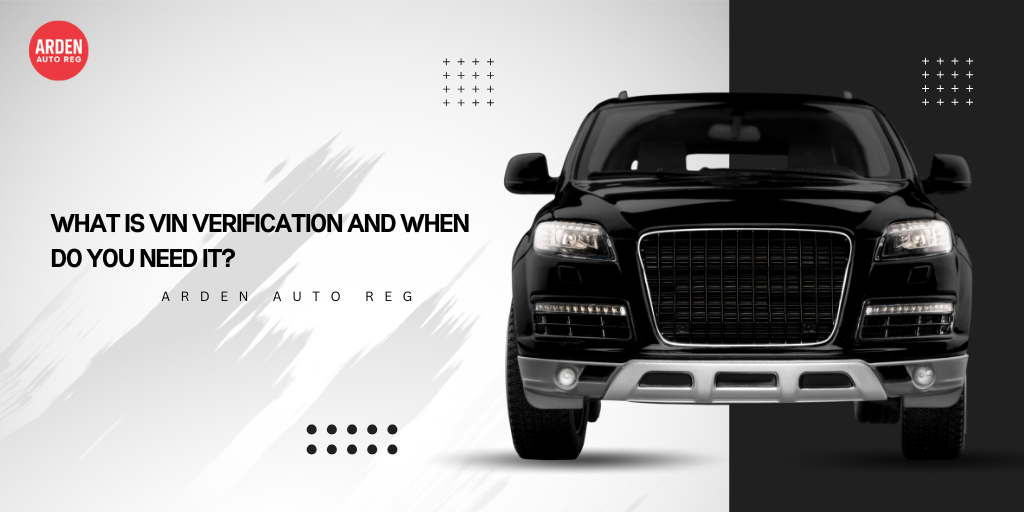
Need to register a used car but stuck on mismatched VIN or missing paperwork? Learn what VIN verification really means, when it’s required, and how Arden Auto Reg makes the process simple and stress-free—so your registration gets approved the first time, without delays or costly mistakes.
Have you ever tried registering a used car only to hit a wall because of mismatched paperwork or missing documentation? The crucial step you’re missing might just be VIN verification. At Arden Auto Reg, we break down exactly what VIN verification is, why it’s so important, and when you’ll need it—without jargon or confusion.
Understanding VIN Verification
VIN verification, also known as a VIN inspection, is a physical examination of a vehicle to confirm that the Vehicle Identification Number stamped on key parts matches the number listed on your title and registration documents.
Unlike a background check, VIN verification does not reveal accidents, previous owners, or service history. Instead, it focuses solely on authenticity—making sure the car you own (or plan to buy) is the same vehicle described in your paperwork.
The inspection is carried out by authorized individuals, which could be DMV officials, licensed VIN verifiers, or law enforcement officers, depending on your state’s rules.
Why VIN Verification Matters
At Arden Auto Reg, we often see customers frustrated because their vehicle registration is delayed or rejected. One common reason? Skipping VIN verification. Here’s why this step is so important:
1. Fraud Prevention
VIN verification ensures the vehicle hasn’t been tampered with. If a plate has been altered, scratched, or replaced, a trained inspector will catch it. This protects buyers from unknowingly purchasing stolen or fraudulent cars.
2. Legal Compliance
Many states require VIN verification for specific scenarios, such as registering an out-of-state or imported car. Without a completed verification, the DMV will not process your registration or title transfer.
3. Error Correction
Even legitimate vehicles sometimes have clerical mistakes in their records. Wrong model year, incorrect body type, or typos in the VIN can prevent registration. VIN verification provides proof to correct these errors smoothly.
When Do You Need VIN Verification?
VIN verification isn’t required for every vehicle, but certain situations make it mandatory. Some of the most common include:
-
Out-of-State or Imported Vehicles
If you’re registering a car from another state or country, a VIN verification ensures the vehicle matches its paperwork before entering your state’s DMV database. -
Salvage or Rebuilt Vehicles
Cars that have been salvaged or rebuilt usually require verification to prove they’re roadworthy and match the title being issued. -
Odometer Discrepancies
When mileage readings don’t add up, a VIN verification can help validate the integrity of the vehicle. -
Body Type Changes
Vehicles that have undergone significant modifications—like turning a van into a camper or changing a truck’s flatbed—often need verification to update DMV records. -
Missing Records
If a vehicle is not found in DMV databases or its documents are incomplete, VIN verification may be necessary to rebuild a reliable record. -
Peace of Mind
Even when it isn’t legally required, many buyers choose VIN verification to protect themselves against fraud or hidden problems.
How VIN Verification Works—Step by Step
The process may sound complicated, but in reality, VIN verification is straightforward. Here’s a simplified overview:
-
Check State Requirements
Each state sets its own rules. Some allow private verifiers, while others only accept law enforcement or DMV officials. -
Collect Your Documents
You’ll need the vehicle’s title, registration, bill of sale, and any state-specific forms before your appointment. -
Vehicle Inspection
The verifier physically checks VIN locations on the car—usually on the dashboard, door frame, engine block, and other parts—to confirm consistency. -
Verification Form
Once completed, the inspector signs off on an official VIN verification form. -
Submit to DMV
With the form in hand, you can finalize your registration, title transfer, or correction request.
How Much Does VIN Verification Cost?
VIN verification costs vary depending on how and where it’s done.
-
DMV or law enforcement offices often provide the service for free.
-
Private licensed verifiers or mobile services typically charge $10–$50, depending on location and travel distance.
👉 Important Note: These prices are only estimates. Actual fees may vary depending on your state, the type of vehicle, and the service provider.
Conclusion
VIN verification is more than just a formality—it’s a safeguard for vehicle owners, buyers, and regulators alike. By ensuring your vehicle’s identity is accurate and properly recorded, you protect yourself from legal issues, fraudulent activity, and costly registration delays. While the process may seem minor, its impact is significant, especially for out-of-state, salvaged, or modified vehicles. At Arden Auto Reg, we specialize in simplifying this process, providing clear guidance and reliable support from start to finish. With the right expertise on your side, VIN verification becomes a seamless step toward stress-free vehicle ownership.
Take the Stress Out of Vehicle Registration with Arden Auto Reg
Don’t let VIN verification hold up your registration. At Arden Auto Reg, we guide you from start to finish—explaining requirements, arranging inspections, and making sure your paperwork gets approved on the first try. Whether you’re registering an out-of-state car, a salvage vehicle, or correcting errors in your title, our expert team handles every detail. Save time, avoid DMV confusion, and enjoy peace of mind. Get in touch with Arden Auto Reg today and let us simplify the VIN verification process for you.

